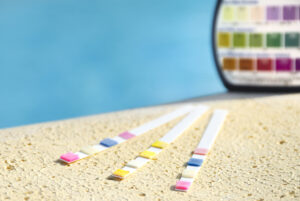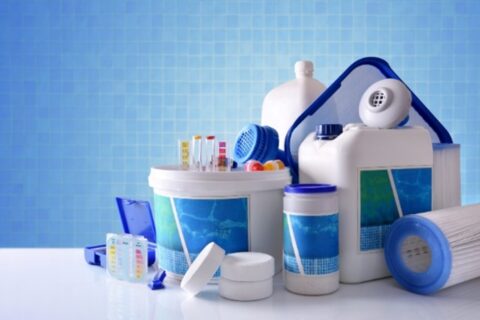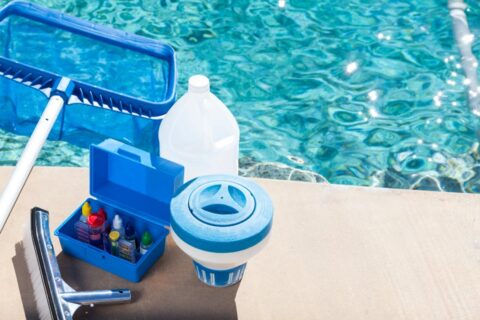Pool Chemistry 101: A Beginner’s Guide to Balancing Water Chemistry
Pool Chemistry 101: A Beginner’s Guide to Balancing Water Chemistry
Maintaining a swimming pool is not just about keeping it clean and inviting; it’s also about ensuring the water chemistry is balanced. A clear pool doesn’t always mean a balanced pool. Balancing water chemistry is crucial for the health and safety of swimmers, as well as for the longevity of the pool itself and the equipment. Improperly balanced pool water can lead to skin and eye irritation, damage to pool equipment, and can even encourage the growth of algae and bacteria. This beginner’s guide will walk you through the basics of balancing pool water, covering essential aspects of pool maintenance and swimming pool maintenance that every pool owner should know.
Understanding Water Chemistry
Balancing swimming pool water involves adjusting various chemical levels within the pool to create a safe and pleasant swimming environment. The primary components of pool chemistry that need to be balanced include pH, alkalinity, chlorine (or other sanitizers), calcium hardness, and cyanuric acid.
pH Level
The pH level measures the acidity or alkalinity of the pool water on a scale from 0 to 14, with 7 being neutral. The ideal pH range for pool water is between 7.4 and 7.6. Maintaining the correct pH level is critical because it affects how effective the chlorine will be in sanitizing the water. A pH level that is too low (acidic) can cause skin and eye irritation and serious damage to the pool equipment, while a pH level that is too high (alkaline) can lead to cloudy water and scale formation.
Alkalinity
Alkalinity serves as a buffer for the pH level, helping to stabilize it. The recommended total alkalinity level for pool water is between 80 and 120 parts per million (ppm). If alkalinity is too low, pH levels can fluctuate widely; if it’s too high, it can make adjusting the pH more difficult.
Chlorine
Chlorine is the most common sanitizer used in pools to kill bacteria and algae. The ideal chlorine level for a swimming pool is between 1 and 3 ppm. It’s important to regularly test at least twice per week and adjust chlorine levels to maintain effective sanitation while preventing irritation to swimmers’ skin and eyes.
Calcium Hardness
Calcium hardness refers to the amount of dissolved calcium in the pool water. The ideal range is between 200 and 400 ppm. Proper calcium levels prevent the water from becoming corrosive, which can damage the pool’s surfaces and equipment, or from causing scale buildup.
Cyanuric Acid
Cyanuric acid helps stabilize chlorine levels by protecting chlorine from being quickly degraded by the sun’s ultraviolet (UV) rays. The recommended level of cyanuric acid in pool water is between 30 and 50 ppm.
Balancing Pool Water: Step-by-Step
Balancing pool water involves testing the water, interpreting the results, and adding chemicals as needed to adjust the levels.
- Testing the Water
Regularly testing your pool water is the first step in maintaining balanced chemistry. All Seasons offers free professional water testing services in-store. If you are looking to maintain the pool yourself, you can use test strips, liquid test kits, or digital testers to measure the levels of pH, alkalinity, chlorine, cyanuric acid, and calcium hardness. It’s advisable to test and balance the water at least per week.
- Adjusting pH and Alkalinity
If the pH level is outside the ideal range, you can add a pH increaser to raise it or a pH decreaser to lower it. To adjust alkalinity, you can use sodium bicarbonate to increase it or muriatic acid to decrease it. It’s important to adjust alkalinity first, as this can affect the pH level.
- Managing Chlorine Levels
To maintain the proper chlorine level, you may need to add chlorine tablets, granules, or liquid chlorine. If the chlorine level is too high, you can lower it by partially draining the pool and adding fresh water or using a chlorine neutralizer.
- Adjusting Calcium Hardness and Cyanuric Acid
If calcium hardness is too low, you can add a calcium hardness increaser. If it’s too high, diluting the pool with fresh water is the best approach. To adjust cyanuric acid levels, add cyanuric acid to increase or dilute the pool to decrease it. If you are struggling to manage your calcium hardness levels or cyanuric acid levels we would advise to get it professionally tested before you decide to dilute the water to receive the best guidance and instruction on replacing water.
Pool Maintenance Tips
Regular pool maintenance is essential for keeping the water chemistry balanced. Here are some valuable tips for effective swimming pool maintenance:
Regular Cleaning: Brush and vacuum the pool regularly to remove debris and prevent algae growth.
Filter Maintenance: Clean and backwash the pool filter regularly to ensure its operating efficiently.
Circulation: Run the pool pump daily to ensure the water is adequately circulated, which helps distribute the chemicals evenly.
Professional Help: Don’t hesitate to consult a professional pool maintenance service for help, especially if you’re having trouble balancing the water chemistry.
Balancing water chemistry is a fundamental aspect of pool maintenance that every pool owner should master. Understanding and maintaining the correct levels of pH, alkalinity, chlorine, calcium hardness, and cyanuric acid can ensure your pool remains a safe, clean, and inviting place to swim. Regular testing and adjustment of these levels, along with consistent pool cleaning and maintenance practices, will help prolong the life of your pool and enhance the swimming experience for everyone. Remember, a well-maintained pool is the key to endless summer fun.
Ready to enhance your outdoor living? Choose All Seasons Pools & Spas Inc! From innovative pool designs to pool and spa repairs, our experienced team ensures your vision comes to life with precision. With additional expertise in fireplaces, pergolas, and pavilions, we tailor our services to fit your needs and budget perfectly. Whether it’s maintenance, repairs, or upgrades, we’ve got you covered. Explore online or visit our showroom today to transform your outdoor space. Contact us online or at 708-349-2222 to get started!


